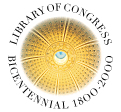


Public Affairs Office
101 Independence Ave. SE
Washington DC 20540-1610
tel (202) 707-2905
fax (202) 707-9199
March 23, 1999
Contact: Helen Dalrymple (202) 707-1940
Papers of Pioneering Arab-American Author Donated to Library of Congress
The Albert Ferris Rihani family has donated to the Library of Congress facsimiles of the manuscripts of all of the English works of pioneer Arab-American author, Ameen F. Rihani (1876-1940). The originals will remain in the family museum in Freike, Lebanon.
This unique set of photocopied manuscripts will make the unpublished primary documents of this influential poet much more accessible to American scholars. The collection recently was processed and is now available for use by registered researchers in the Manuscript Division Reading Room, LM 101, Madison Building, 101 Independence Avenue S.E.
The papers consist of some 1,250 items of correspondence (including incoming letters), biographical material, drafts of essays, historical and political analyses, literary criticism, novels, short stories, plays, poetry, and travel literature reflecting Rihani's Arab- American heritage and the cultures of both the Middle East and the West.
Ameen Rihani's upbringing and the nature of his intellect shaped him into a bilingual and bicultural author. He was born November 24, 1876, in Freike, Lebanon, where his father, Ferris, was a raw silk manufacturer. When the boy was 12, he was sent to the United States with his uncle Salamon, who opened a dry goods store. The father followed the next year. Ameen was soon taken out of school to do the paperwork for the family business in a small cellar in lower Manhattan. During this period, he read widely, discovering Hugo, Shakespeare, and Keats, Shelley and Whitman, among other classic authors of Western civilization.
In 1895 he decided to become an actor and toured with a Shakespearean theater troupe. Desiring a formal education, he was accepted at New York Law School in 1897. When a lung infection interrupted that course of study, he went back to Lebanon to recuperate, where he relearned his native Arabic and began teaching English. There he also studied Arab poets and culture.
Rihani returned to New York in 1898 and began publishing in both Arabic and English. He became a naturalized citizen in the early 1900s. Rihani became friends with the somewhat younger writer Kahlil Gibran, who came to regard him as a mentor. In 1904 he returned to Freike for a five-year period, during which he published essays, allegories, stories and plays in Arabic. His major novel, The Book of Khalid, came out in 1911. It established the basic characteristics of Arab-American literature in general and Lebanese-American literature in particular: the motifs of wisdom and prophecy, which seek to reconcile matter and spirit, and reason and faith, and to unify the beliefs of East and West within a larger universal vision. This work, as well as Rihani's friendship, greatly influenced Gibran.
In 1916 Ameen Rihani married Bertha Case, an American artist. He traveled again to the Arabian Peninsula in 1922, meeting, interviewing and befriending all its rulers. He lectured widely, often carrying the banner of American democracy and advocating Arab independence from Ottoman Turkey and Europe. He died at his birthplace in 1940.
Recognized as the founder of Arab-American literature, Ameen Rihani was the first American of Arab heritage to devote himself to writing literature, the first to publish a novel in English, and the first Arab author to write English-language essays, poetry, novels, short stories, art critiques, and travel chronicles. He was the author of 29 volumes in English. His early writings in English mark the beginning of a body of literature that is Arab in its concern, culture and characteristics, English in language, and American in spirit.
# # #
PR 99-029
3/23/99
ISSN 0731-3527